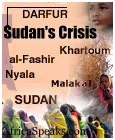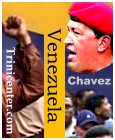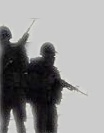 |






 AfricaSpeaks Weblog AfricaSpeaks Weblog
 Rootswomen Weblog Rootswomen Weblog
 Rootsie's Weblog Rootsie's Weblog
|
Uncertainty in Saudi Arabia
Posted: Thursday, May 29, 2003
Power and Interest News Report (PINR)
Reprinted with express approval from http://www.pinr.com
The leadership in Saudi Arabia is in danger and, in fact, has been for some time. The Arabian Peninsula, the heart and soul of the Islamic world since its genesis 1400 years ago, has now become the shelter for one of the Middle East's most austere and traditional governments and societies. And it is because of this that the opaque administration of an ailing King Fahd and his ostensible, yet highly contested, successor, Crown Prince Abdullah, is coming under extreme pressure from both without and within.
For the last several months, factions within Washington's intellectual and foreign policy circles have been calling for the reevaluation of the United States' relationship with the desert monarchy. Many opine that the negative aspects of the existing regime (the Kingdom's perceived social repression and complicity with terrorists) now outweigh the positive ones (Saudi Arabia contains the largest quantities of the most crucial resource on the planet: oil).
Usually, most critics begin with the fact that 15 of the 19 hijackers involved in the September 11th attacks were Saudi nationals. They then point to a political system (or lack thereof) and society that most Westerners find a bit repressive, if not backward and wholly unacceptable -- one which nurtures and exports terrorism. When combined with the geopolitical significance of Saudi oil reserves, the country becomes one over which Washington can't help but exert a certain amount of control and, if need be, critics maintain, its desires for the Kingdom can legitimately be realized through force or "regime change."
In July 2002, during a briefing given to the Defense Advisory Board, a group that advises the Pentagon, an analyst with the Rand Corporation, Laurent Murawiec, depicted Saudi Arabia as a terrorist state that should be considered an enemy of the United States.
Murawiec said, "The Saudis are active at every level of the terror chain, from planners to financiers, from cadre to foot soldier, from ideologist to cheerleader. Saudi Arabia supports our enemies and attacks our allies [and is responsible for a] daily outpouring of virulent hatred against the U.S. from Saudi media, 'educational' institutions, clerics, officials -- Saudis tell us one thing in private; do the contrary in reality."
Towards the end of the presentation, he added: "There is an 'Arabia,' but it needs not be 'Saudi.'" A brief list is also given, outlining interests Washington could target in order to pressure Riyadh: oil, economic security, The Holy Places.
This briefing caused a wave of anti-Saudi stories to flood the mainstream media in the United States. From radio talk shows to cable news to political journals, the U.S.-Saudi relationship was experiencing new levels of scrutiny. For example, News Hour with Jim Lehrer ran a segment entitled "Friend or Foe" in reference to Saudi Arabia. This despite the fact that many in the Bush administration were quick to point out that this was not U.S. policy (essentially calling Saudi Arabia evil and supporting regime change), and that Washington maintained an excellent relationship with Riyadh.
Defense Department spokeswoman Victoria Clarke said at the time, "Saudi Arabia is a long-standing friend and ally of the United States. The Saudis cooperate fully in the global war on terrorism and have the Department's and the Administration's deep appreciation." Defense Secretary Donald Rumsfeld made similar comments, and Secretary of State Colin Powell personally called Saudi Arabia to advise Prince Faisal that nothing in the relationship between the two countries had changed, though a heightened sense of Saudi Arabia's terrorist connection persists to the present.
Additionally, as Western opinion exerts pressure from without, many factors work on the Saudi leadership's political control from within, hoping for their own kind of regime change. Since Saddam Hussein's fateful invasion of neighboring Kuwait during the summer of 1990 and Saudi Arabia's subsequent and close cooperation with Washington, the Saudi royal family has become one of Osama bin Laden's and al-Qaeda's chief targets.
Bin Laden took exception when the Saudis rejected his offer of assistance to help oust Saddam Hussein from Kuwait and, instead, turned to Washington. This resulted in the stationing of hundreds of thousands of U.S. troops in the region. Ever since, one of bin Laden's central conditions for a cease-fire in the "war on terrorism" has been the removal of U.S. troops from the Arabian Peninsula. Other hard-line, ideologically right movements within much of the Middle East were also offended that King Fahd allowed foreign troops to use Saudi soil to attack another Arab country. Riyadh's final split with bin Laden occurred in 1994 when they revoked his Saudi citizenship.
The recent bombings in Riyadh, targeting compounds where hundreds of foreign workers involved in the training of the Saudi Arabian National Guard reside, indicate that terrorist forces still have as their goal the destabilization or ouster of the Saudi regime.
There's also domestic pressure from a society that can only be kept sheltered from Western influence and technological modernization for so long. Communications technology alone is influencing societies and organizational potentials like never before. Because of this, Saudi society has a greater window on the rest of the world than at any other time in their history. People are simply now more aware of what their country does not offer them.
This greatly threatens the House of Saud's power because it has been this very ignorance that has kept citizens indoctrinated in the monarchy's own version of history, which emphasizes the legitimacy of the Saudi dynasty through the mythologizing of the dynasty's founder, Ibn Saud. Wahhabism and its founder, Muhammad Ibn Abd al-Wahhab, are also emphasized, but to a lesser degree, creating another point of contention between the monarchy and its fundamentalist critics; by stressing Saudi lineage more than Wahhabism, many feel that Islam occupies a secondary role in official state history.
The more Saudis know about the history of their region, other branches of Islam, and alternative political systems, the less "royal" and God-given the House of Saud will appear to be; they will become more illegitimate -- both politically and religiously -- with each passing year. Moreover, communications and information technologies will be instrumental in the dissemination of these sentiments. The threat from religious fundamentalists, including those militants fighting for more specific political causes, will complement the less radical but more legitimate domestic dissent. Diplomatic ambiguity on the part of the United States and widely consumed news that questions Saudi Arabia's role in the war on terror will only assist in the creation of a global and regional environment that threatens to irreparably destabilize Saudi Arabia and possibly topple the House of Saud.
Matthew Riemer drafted this report.
The Power and Interest News Report (PINR) is an analysis-based publication that seeks to, as objectively as possible, provide insight into various conflicts, regions and points of interest around the globe. PINR approaches a subject based upon the powers and interests involved, leaving the moral judgments to the reader. PINR seeks to inform rather than persuade. This report was reprinted with express approval from http://www.pinr.com. All comments should be directed to content@pinr.com.
 Printer friendly version Printer friendly version
 Send page by E-Mail Send page by E-Mail
|








